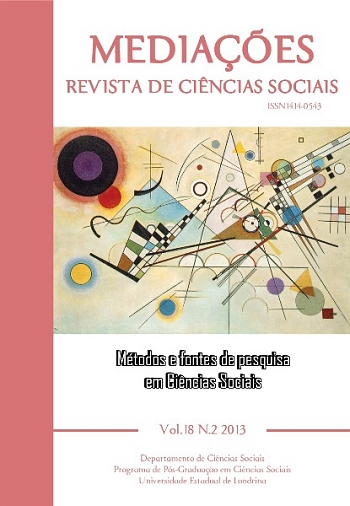Casuality and mechanisms in political science
DOI:
https://doi.org/10.5433/2176-6665.2013v18n2p10Keywords:
Causality, Mechanics, Inference, Research designAbstract
This paper stands that Political Science empirical research designs should be crafted in order to produce falsifiable causal inferences. Infer as a process of using available information to know about unavailable data. Causal in the sense that the occurrence of x should changes the probability of occurrence of y. And falsifiable in order that at any moment the inference could be demonstrated wrong by a concurring research design. In addition, explanations should identify the causal mechanism that links explanans and explanandum.Downloads
References
BRADY, Henry; COLLIER, David (Org.). Rethinking social inquiry: diverse tools, shared standards. Lanham: Rowman & Littlefield, 2004.
BRAMBOR, Thomas; CLARK, William R.; GOLDER Matt. Understanding interaction models: Improving empirical analyses. Political Analysis, Oxford, v. 14, n. 1, p. 63-82, 2006.
BUNGE, Mario. Mechanism and explanation. Philosophy of the Social Science, New York, v. 27, n. 4, p. 410-465, 1997.
CAMPBELL, Donald; STANELY, Julian. Experimental and quasi-experimental designs for research. Chicago, Illinois: Rand McNally, 1996.
DEAN, Angela M.; VOSS, Daniel. Design and analysis of experiments. New York: Springer, 1999.
DELLA PORTA, Donatella; KEATING, Michael (Ed.). Approaches and methodologies in the social sciences: a pluralist perspective. Cambridge: Cambridge University Press, 2008.
ELSTER, Jon. Nuts and bolts for the social sciences. Cambridge: Cambridge University Press, 1989.
FIGUEIREDO FILHO, Dalson; SILVA JUNIOR, José Alexandre; ROCHA, E. O que fazer e o que não fazer com a regressão: pressupostos e aplicações do modelo linear de mínimos quadrados ordinários (MQO). Política Hoje, Recife, v. 20, n. 1, 44-99, 2011.
FRIEDRICH, Robert J. In defense of multiplicative terms in multiple regression equations. American Journal of Political Science, Austin, v. 26, n. 4, p. 797-833, 1982.
GERRING, John. Social science methodology: a criterial framework. Cambridge: Cambridge University Press, 2001.
GERRING, John. Causation: a unified framework for the Social Sciences. Journal of Theoretical Politics, London, v.17, n. 2, p.163-98, 2005.
HEDSTRÖM, Peter; SWEDBERG, Richard. Social mechanisms: an introductory essay. In: HEDSTRÖM, Peter; SWEDBERG, Richard. Social mechanisms: an analytical approach to social theory. New York: Cambridge University Press, 1998.
HOLLAND, Paul. Statistics and causal inference. Journal of the American Statistical Association, Baltimore, v. 81, p. 945-60, 1986.
JACCARD, James; TURRISI, Robert; WAN, Choi. Interaction efects in multiple regression. Newbury Park, CA: Sage, 1990.
KING, Gary; KEOHANE, Robert; VERBA, Sidney. Designing social inquiry: scientific inference in qualitative research. Princeton: Princeton University Press, 1994.
KITSCHELT, Hebert. Accounting for postcommunist regime diversity: what counts as a good cause? In: EKIERT, Grzegorz; HANSON, Stephen E. (Ed.). Capitalism and democracy in central and eastern europe. Cambridge: Cambridge University Press, 2003. p. 49-86.
KUHH, Thomas. A estrutura das revoluções científicas. 3. ed. São Paulo: Perspectiva, 1975.
MAHONEY, James. Path-Dependent explanations of regime change: Central America in comparative perspective. Studies in Comparative International Development, Sant Louis, v. 36, p. 111-141, 2001.
MARSH, David; FURLONG, Paul. A skin not a sweater: ontology and epistemology in political science. In: MARSH, David; STOKER, Gerry. (Ed.). Theory and methods in political science. Basingstoke: Palgrave, 2002. p. 17-44.
MERTON, R. Social theory and social structure. NewYork: The Free Press, 1968.
MONTGOMERY, Douglas. Design and analysis of experiments. 5 th edn. New York: John Wiley & Sons, 2001.
PEARL, Judea. Causality: models, reasoning, and inference. New York: Cambridge University Press, 2000.
RATTON JUNIOR, Jose Luiz; MORAIS, Jorge Ventura de. Para ler Jon Elster: limites e possibilidades da explicação por mecanismos nas Ciências Sociais. DADOS - Revista de Ciências Sociais, Rio de Janeiro, v. 46, n. 2, p. 385-410, 2003.
RUBIN, Donald B. Estimating causal efects of treatments in randomized and nonrandomized studies. Journal of Educational Psychology, Arlington, v. 66, n. 5, p. 688-701, 1974.
SALMON, Wesley. Scientific explanation: three basic conceptions. Proceedings of the biennial Meeting of the Philosophy of Science Association. Symposia and Invited Papers, Chicago, v. 2, p. 293-305, 1984.
SANDERS, David. Behaviouralism. In: MARSH, David; STOKER, Gerry (Ed.). Theory and methods in political science. Basingstoke: Palgrave, 2002. p. 45-64.
SHADISH, R.; COOK, T.; CAMPBELL. Experimental and quasi-experimental Designs of generalized causal inference. New York: Houghton Mifflin Company, 2002.
STINCHCOMBE, Arthur. The conditions of fruitfulness of theorizing about mechanisms in Social Science. Philosophy of the Social Sciences, Waterloo, v. 21, n. 3, p. 367-388, 1991.
TILLY, Charles. Mechanisms in political process. Annual Review of Political Science, Palo Alto, v. 4, p. 21-41, 2001.
VAN EVERA, Stephen. Guide to methods for students of political science. Ithaca, NY: Cornell University Press, 1997.
ZALD, Mayer N. Progress and cumulation in the human sciences after the fall. Sociological Forum, New York, v. 10, n. 3, p. 455-479, 1995.
Downloads
Published
How to Cite
Issue
Section
License
Copyright (c) 2014 Dalson Britto Figueiredo Filho, Enivaldo Carvalho da Rocha, José Alexandre da Silva Júnior, Ranulfo Paranhos

This work is licensed under a Creative Commons Attribution 4.0 International License.
Copyright on articles published in Mediações belongs to the author(s): in the case of partial or entire republication of the original publication, we ask author(s) to indicate the original publication in the periodical.
Mediações uses the Creative Commons Attribution 4.0 International license, which allows Open Access, enabling any user to read, download, copy and disseminate its content so long as adequately referenced.
The opinions expressed by the author(s) are their sole responsibility.

































